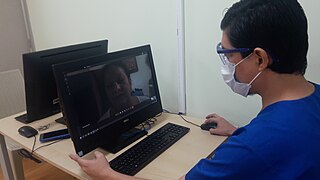
Telehealth is the distribution of health-related services and information via electronic information and telecommunication technologies. It allows long-distance patient and clinician contact, care, advice, reminders, education, intervention, monitoring, and remote admissions. Telemedicine is sometimes used as a synonym, or is used in a more limited sense to describe remote clinical services, such as diagnosis and monitoring. When rural settings, lack of transport, a lack of mobility, conditions due to outbreaks, epidemics or pandemics, decreased funding, or a lack of staff restrict access to care, telehealth may bridge the gap as well as provide distance-learning; meetings, supervision, and presentations between practitioners; online information and health data management and healthcare system integration. Telehealth could include two clinicians discussing a case over video conference; a robotic surgery occurring through remote access; physical therapy done via digital monitoring instruments, live feed and application combinations; tests being forwarded between facilities for interpretation by a higher specialist; home monitoring through continuous sending of patient health data; client to practitioner online conference; or even videophone interpretation during a consult.
eHealth describes healthcare services which are supported by digital processes, communication or technology such as electronic prescribing, Telehealth, or Electronic Health Records (EHRs). The use of electronic processes in healthcare dated back to at least the 1990s. Usage of the term varies as it covers not just "Internet medicine" as it was conceived during that time, but also "virtually everything related to computers and medicine". A study in 2005 found 51 unique definitions. Some argue that it is interchangeable with health informatics with a broad definition covering electronic/digital processes in health while others use it in the narrower sense of healthcare practice using the Internet. It can also include health applications and links on mobile phones, referred to as mHealth or m-Health. Key components of eHealth include electronic health records (EHRs), telemedicine, health information exchange, mobile health applications, wearable devices, and online health information. These technologies enable healthcare providers, patients, and other stakeholders to access, manage, and exchange health information more effectively, leading to improved communication, decision-making, and overall healthcare outcomes.

Apollo Hospitals Enterprise Limited is an Indian multinational healthcare group headquartered in Chennai. It is the largest for-profit private hospital network in India, with a network of 71 owned and managed hospitals. Along with the eponymous hospital chain, the company also operates pharmacies, primary care and diagnostic centres, telehealth clinics, and digital healthcare services among others through its subsidiaries.
Google Health encompasses the health and wellbeing initiatives of Google, including Fitbit and a range of other features and integrations. Google Health started in 2008 as an attempt to create a repository of personal health information in order to connect doctors, hospitals and pharmacies directly. The Google Health project was discontinued in 2012, but the Google Health portfolio re-established in 2018 before being redescribed in 2022 as an "effort" rather than a distinct division.

Telepsychiatry or telemental health refers to the use of telecommunications technology to deliver psychiatric care remotely for people with mental health conditions. It is a branch of telemedicine.

First Databank (FDB) is a major provider of drug and medical device databases that help inform healthcare professionals to make decisions. FDB partners with information system developers to deliver useful medication- and medical device-related information to clinicians, business associates, and patients. FDB is part of Hearst and the Hearst Health network.
Sharecare, Inc. is an Atlanta, Georgia-based health and wellness company that provides consumers with personalized health-related information, programs, and resources. It provides personalized information to the site's users based on their responses to the RealAge Test, the company's health risk assessment tool, and offers a clinical decision support tool, AskMD. Headquartered in Atlanta, Sharecare was founded in 2010 by Jeff Arnold and Dr. Mehmet Oz, in partnership with Remark Media, Harpo Studios, Sony Pictures Television and Discovery Communications.

Zocdoc is a New York City-based company offering an online service that allows people to find and book in-person or telemedicine appointments for medical or dental care. The platform also functions as a physician and dentist rating and comparison database. The service is free for patients, and doctors pay to advertise their appointment slots. Established in 2007, the private company had a $1.8 billion valuation by August 2015, the third-highest for a startup in New York at the time.

HealthTap is a medical group and technology company delivering telehealth virtual healthcare via the web and health apps. Their customers include health consumers in the United States, health systems, insurance companies, and self-insured employers.
Doximity is an online networking service for medical professionals. Launched in 2010, the platform offers its members curated medical news, telehealth tools, and case collaboration.
American Well Corporation, doing business as Amwell, is a telemedicine company based in Boston, Massachusetts, that connects patients with doctors over secure video. Amwell sells its platform as a subscription service to healthcare providers to put their medical professionals online and its proprietary software development kits, APIs, and system integrations enable clients to embed telehealth into existing workflows utilized by providers and patients.

Greenway Health, LLC is a privately-owned vendor of health information technology (HIT) including integrated electronic health record (EHR), practice management, and revenue cycle management solutions. Intergy, Greenway’s cloud-based EHR and practice management solution, serves ambulatory healthcare practices. The company has offices in Tampa, Florida; Carrollton, Georgia; and Bangalore, India.
An earthquake struck Nepal at on 25 April 2015 with a moment magnitude of 7.8 and a maximum Mercalli intensity of IX (Violent). It was the most powerful earthquake to strike Nepal since the 1934 Nepal–Bihar earthquake. Many thousands of people died, with most casualties reported in Nepal, and adjoining areas of India, China,Bhutan and Bangladesh.
Teladoc Health, Inc. is a multinational telemedicine and virtual healthcare company headquartered in the United States. Primary services include telehealth, medical opinions, AI and analytics, telehealth devices and licensable platform services. In particular, Teladoc Health uses telephone and videoconferencing software as well as mobile apps to provide on-demand remote medical care.
Babylon Health was a digital-first health service provider that combined an artificial intelligence-powered platform with virtual clinical operations for patients. Patients are connected with health care professionals through their web and mobile application.

Ro is an American telehealth company that diagnoses patients, and subsequently prescribes and delivers treatments. The company is headquartered in New York City.
Lybrate is a mobile healthcare technology company that developed an online platform to connect doctors and patients. The company was founded in 2013 and is headquartered in Delhi, India. The service allows patients to connect with the doctor online through a video call or schedule an appointment and can get info about medication.
AlTibbi is a digital health platform in the Middle East and North Africa (MENA). Launched by both Jalil Labadi and his father, Dr. Abdel Aziz Labadi, in 2008 in Amman, Jordan. The platform aims to present reliable, up-to-date and simplified medical information to users in the region in Arabic, according to their proclaimed mission. Today, the website features medical articles, a medical glossary, a section that is dedicated to questions and answers, the latest news in medicine, telehealth services and consultations. AlTibbi has also partnered with Mawdoo3, a leading online Arabic content provider, to provide content to the audience in the region.
This list of telemedicine services providers is for notable telemedicine, telehealth, and mobile health providers and services. This includes virtual care facilities for remote care, services or platforms used for specific steps within the healthcare industry, and clinical navigation.

Before the COVID-19 pandemic, telehealth adoption was gradually increasing. With the outbreak of COVID-19 in early 2020, healthcare professionals reduced in-person visits to minimize exposure. This led to an increase in the use of telemedicine. with a concomitant increase in publications.. Telehealth has since remained widely utilized in healthcare services.








